Sharing a Successful Lunch & Learn with the Women's Heart Health Education Committee
By Aubra Gaston
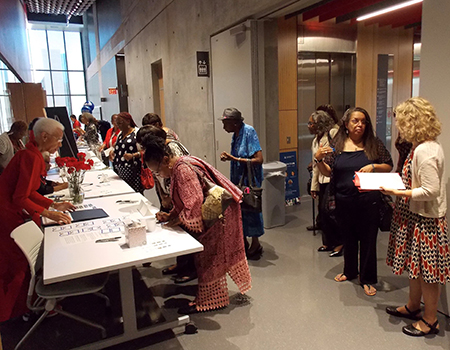
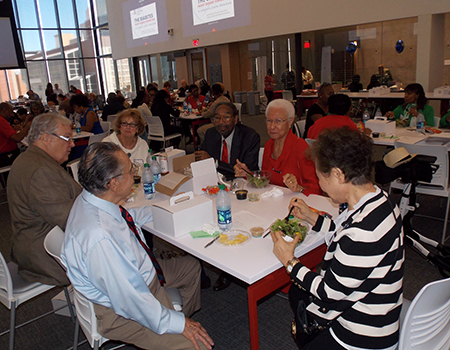
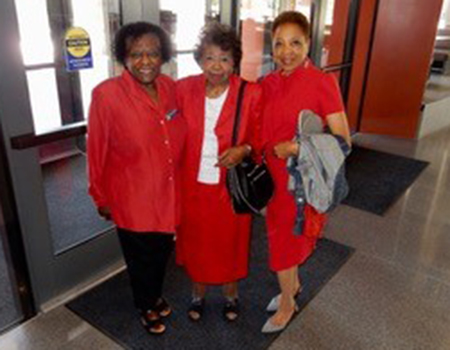
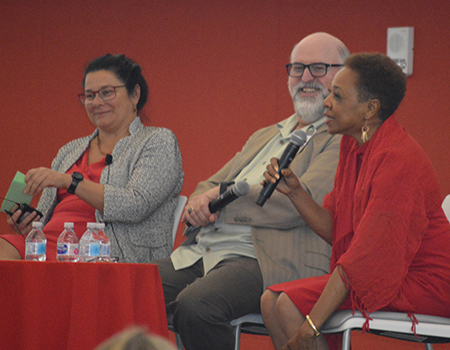
Thanks to the 2019 Lunch & Learn planning committee for dedicating more than 12 months to plan and organize a heart health education program for 138 people in our community. The Diabetes/Heart Disease Connection, held in the newly completed University of Arizona Health Sciences Innovation Building, featured three dynamic speakers: David Marrero, PhD, professor of public health and medicine and director of the Center for Elimination of Border Health Disparities at UArizona Health Sciences; Nancy Sweitzer, MD, PhD, director of Sarver Heart Center and professor of medicine and chief, Division of Cardiology; and Linda Dingle, RN, CDE, public health nurse, Pima County Health Department.
The planning committee consistently and enthusiastically embraced and supported the spirit, mind and teachings to expand heart health learning and awareness in our community.
Champions of the Mary Anne Fay Heart Health Advocate Award
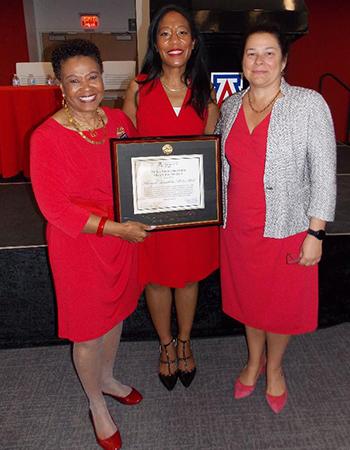
This award is given annually to recognize those who share Mary Anne’s dedication, vision and leadership in advancing women’s heart health. These Mary Anne Fay Award recipients exemplify these characteristics:
Leadership - Wanda F. Moore (2011 recipient), chair of the Minority Outreach Program, serves on the Sarver Heart Center board and women's committee. She launched the Minority Outreach Program in 2009 and has led volunteers who have contributed more than 550,000 hours to reach more than 6,000 people in the community.
Dedication – Dr. Breathett, assistant professor of medicine, focuses her research on reducing racial/ethnic and gender disparities in advanced heart failure and preventing those populations from developing advanced heart failure.
Vision – Nancy K. Sweitzer, MD, PhD (2018 recipient), director of the Sarver Heart Center, professor of medicine and chief of cardiology, sets a vision for improving care for women with heart disease, not only through community education, but also through her leadership commitment to encourage more women to choose cardiology as a career.
CCHHE Looks into Special Training for Providers Serving Women Veterans
By Algurie Wilson
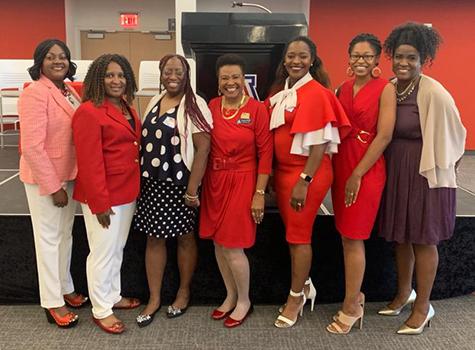
As the Community Coalition for Heart Health Education extends its reach, volunteers regularly discover new groups to support. Women veterans are the fastest growing population seeking care in the Veteran Administration (VA).
VA’s Women’s Health Services (WHS) provides clinical training opportunities to equip VA providers and nurses to better support women veterans’ long-term health and well-being.
The Women’s Health Mini-Residency training bolsters the expertise of VA’s primary and emergency care providers and nurses to address the unique needs of women including contraception, abnormal uterine bleeding, pelvic pain and screening for breast and cervical cancer. It also covers burdens of deployment, physical demands of heavy gear, combat exposure, potential for military sexual trauma (about 1 in 5 women seen in VHA respond “yes” when screened for military sexual trauma), and post-deployment readjustment that can impact women differently than men.
At each VA Medical Center nationwide, a Women Veterans Program Manager is designated to advise and advocate for women veterans.
Our CCHHE Volunteers and Community Outreach
By Cheryl Alli
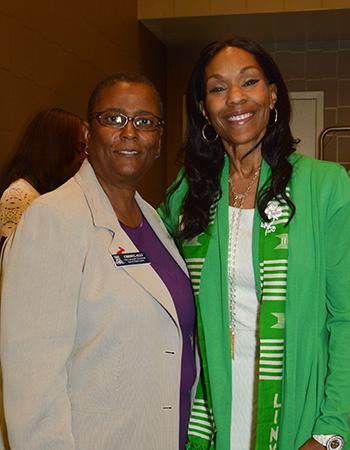
Understanding that the risk factors for cardiovascular disease begin in the early years, CCHHE volunteers know that women should not have to choose between lifesaving information and the demands of family or employment. Our unique approach has been to bring education to the individuals, including women and others. Our teams travel throughout Tucson providing chest-compression-only CPR training and heart health education to groups ranging from school-aged children to senior citizens.
The impact of our commitment is evident in the community. Individuals leave our meetings knowing they can implement lifestyle changes immediately to improve their heart health. Knowing that we can empower communities to reduce cardiovascular disease keeps us committed!
CCHHE Collaboration with Community Partners Extends Outreach
By Wanda F Moore
Engaging with our community partners in an effort to expand outreach education in the community creates greater opportunity, resource efficiency and productivity toward the common goals of health education to our minority and underserved communities. Our combined collaborative skills bring about a dedicated spirit of commitment and mutual respect toward our shared goals. This month we acknowledge and give special thanks to the following partners for their outstanding support in collaboration with CCHHE:
- Tucson Chapter of Links Inc. for their continued outstanding support of minority outreach education, Dr. Breathett’s research and their continued attendance at our community meetings and events for health care.
- Long Realty Cares Foundation
- Sankofa Fund c/o Community Foundation of Southern Arizona
- Family of Regina G. Penn Memoriam
- Green Valley Pecan Company
- Tucson Alumnae Chapter of Delta Sigma Theta Inc.
- Military women active & retired (Veterans)
Thank you!
Checking Glucose Can Save Your Life
By Khadijah Breathett, MD, MS, FACC, FAHA
Diabetes mellitus is a major risk factor for cardiovascular disease. Diabetes contributes to retinopathy, coronary heart disease, heart failure, stroke, kidney failure, and limb loss.1 Coronary heart disease is the leading cause of death for individuals with diabetes.
The population of individuals with diabetes mellitus is growing. Diabetes disproportionately affects racial and ethnic minorities.1,2 From highest to lowest prevalence, diabetes affects approximately 15% American Indians and Alaska Natives, 13% African-Americans, 12% Hispanics, 8% Asians, and 7% Whites.3 Approximately 26 million adults are living with known diabetes in the United States.1 Another 92 million U.S. adults have prediabetes and are at risk for developing diabetes.1 Unfortunately, 80% of individuals with diabetes do not have their diabetes under control.1 Approximately a quarter are not aware that they have diabetes.
What is pre-diabetes?
- Fasting glucose 100-125 mg/dL
- Hemoglobin A1c 5.7-6.4%
How do you know that you have diabetes?
- Random glucose >200 mg/dL
- Fasting glucose >126 mg/dL
- Hemoglobin A1c > 6.5%
How do you prevent diabetes?
- Ideal Cardiovascular Risk Factors—Simple 7
- Good nutrition (low fat, low cholesterol, high vegetables), Body Mass Index <25, Daily exercise (30 minutes of aerobic exercise per day), normal blood pressure (<130/<80), no tobacco, normal cholesterol, IDEAL GLUCOSE (fasting glucose <100mg/dL)
- Metformin helps reduce risk for some individuals with pre-diabetes
How do you treat diabetes?
According to the American Diabetes Association, diabetes control is defined by hemoglobin A1c of <7% (mean glucose 154 mg/dL).4 Multiple forms of treatment can be used to reach this goal.
- First, insulin is the primary treatment of diabetes, particularly poorly controlled diabetes. However, there are multiple non-insulin medications that can be used to effectively treat diabetes. There are newer medication classes that can treat diabetes, prevent cardiovascular disease, and death, such as sodium-glucose cotransporter 2 inhibitors.
- Second, check your glucose regularly. The frequency will depend on the level of disease and control. This should be discussed with a clinician.
- Third, lifestyle should be changed to achieve ideal cardiovascular risk factors, Simple 7.
For more information, please visit Sarver Heart Center’s prevention page.
Sources:
1. Heart Disease and Stroke Statistics-2019 Update: A Report From the American Heart Association.
2. Diabetes - The Office of Minority Health
3. Statistics About Diabetes
4. American Diabetes Association
5. Diabetes Care. American Diabetes Association
Meet CCHHE’s Hidden Treasure, Murryelle Bothwell
By Marilyn Robinson
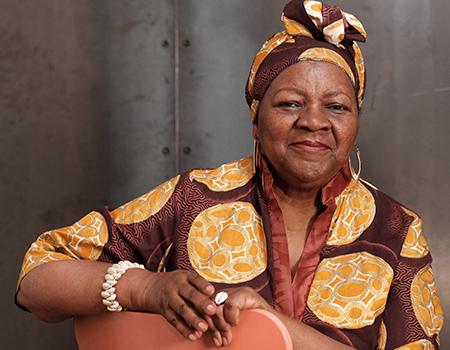
After completing Homer G. Phillips School of Nursing, a segregated school in St Louis, MO, Murryelle embraced her love of travel when she joined the Army Nurse Corps during the Viet Nam era and was stationed in Germany. She earned the rank of captain. Following parental guidance, she earned numerous degrees and certifications, including B.S. in nursing, M.A. in guidance and counseling, M.S. in nursing and nurse practitioner in psychiatric mental health (PMHNP).
Working first with physicians then in private practice, Murryelle met her goal of providing equal health care for all with an emphasis on African Americans.
Believing “service is the rent you pay for your room here on earth,” Murryelle belongs to and supports the National Association for the Advancement of Colored People (NAACP);
League of Women Voters; University of Arizona Arthritis Center; Black Film Club of Tucson; Interdenominational Ministerial Alliance (IMA); Interfaith Community Services (ICS); African American Retirees of Tucson (AART) and the Sarver Heart Center Women’s Heart Health Education Committee Minority Outreach Program. She is a wife, mother, community activist, a piano student, world traveler, a lifetime learner and a treasure to CCHHE.
When tomorrow starts without our Regina there is still a Blessing
By Wanda Moore


